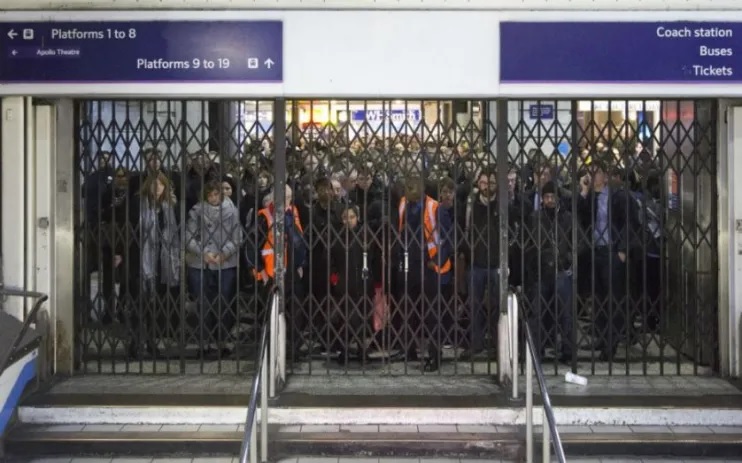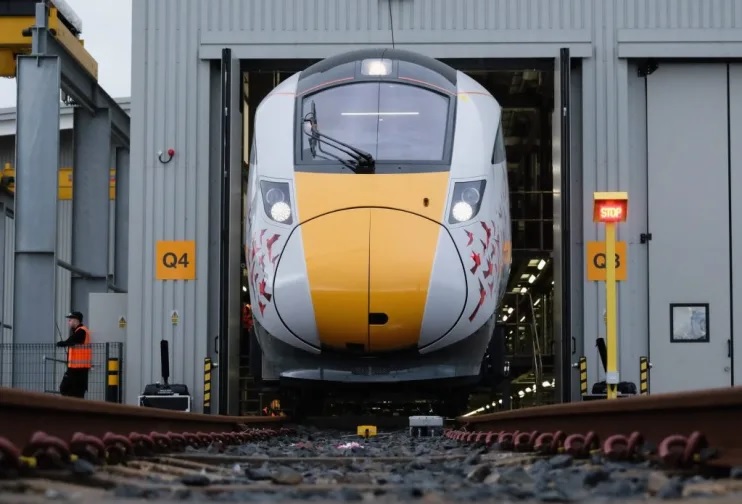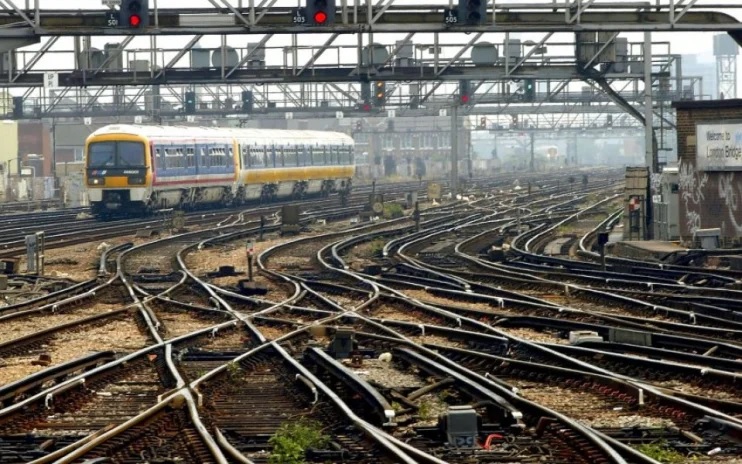UK locks down amid largest rail strike in 30 years – Millions face disruption – Retail footfall slumps

Train and London tube passengers continue to face travel chaos due to the biggest strike by rail workers for a generation.
Brits are urged to work and stay at home today, as road congestion is widely expected.
Bolt crashed earlier this morning following a surge in both demand and prices, while the National Rail Enquiries website stopped working for a few hours earlier today.
Britain’s train operators have released plans for how their services will be altered during this week’s rail strikes. Click here for a full breakdown and to check your local commute.
As a results, rail and Tube strikes are set to cripple services this week, causing travel chaos for passengers across the UK. More information can be found here.

Meanwhile in Scotland, significant disruption across Scotland’s rail network has begun as workers at Network Rail take strike action this week.
Across the country, business chiefs have warned that continued strike actions would cause “incredible” damage to the UK in both the short-term and long-term as firms brace deal with heavy disruption.
Economists at the Centre for Economics and Business Research (CEBR) have warned that the three strikes across Tuesday, Thursday and Saturday will have a fallout worth at least £91 million to the UK economy.
Industry leaders have warned that the costs could be even more as travellers and commuters decide to stay at home.
Richard Burge, chief executive of the London Chamber of Commerce and Industry, warned that the capital “cannot afford a summer of chaos on the railways and tube lines”.
The business boss called for the RMT union, Network Rail, and the Government to return to negotiations amid fears that this week’s action could be repeated later this year.
“What is very worrying is the possibility that this dispute continues through the year and we see multiple strikes into the future.”
Richard Burge, chief executive of the London Chamber of Commerce and Industry
“While this strike will be damaging, a recession is looking likely regardless; as such, I wouldn’t pin an eventual recession on this strike,” he said.
“A week lost every month for the foreseeable future is going to do incredible short-term and long-term damage to the economy and the UK’s reputation as an attractive destination for investment.”
The CEBR has predicted that almost 50% of the impact of the strikes will be felt on Tuesday, when both tube and rail workers are involved in strike action.

Hospitality and retail firms are particularly vulnerable to a financial hit from the loss of trade.
Kate Nicholls, chief executive of UKHospitality, has warned that the rail strike could cost the sector up to £540m.
She said: “Fragile consumer confidence will take a further hit, thousands of people able and willing to spend money in hospitality venues across the country will be prevented from doing so, while staff will undoubtedly struggle to even get to work.
“We should all be pulling in the same direction if we’re to get the UK economy back on track, and want to see urgent and productive talks to avoid widespread disruption, next week.”
Kate Nicholls, chief executive of UKHospitality,
Meanwhile, James Hardiman, senior analyst at the British Retail Consortium (BRC), said: “Unsurprisingly, the upcoming rail strikes will be damaging for retail, as the strikes limit commuter and customer traffic.
“UK footfall is already down on pre-pandemic levels, and this will only slow the progress retailers have made to bring people back in-store.”
Figures published today by retail analysts Springboard reported a 27 per cent slump in central London footfall, while outer London centres were down 6.2 per cent.
“The planned rail strikes are likely to encourage those who can hybrid work to work from home, and therefore footfall in towns and cities is likely to decrease – on the particular strike days but also on non-strike days, due to delays that are likely to be caused on non-strike days due to trains being in the wrong place,” said Springboard insights director Diane Wehrle.
“The latest evidence, from the day of the tube strike, indicates that footfall declined in central London whilst rising marginally in outer London.
“An increase in activity in outer-London centres has been synonymous with home working as people are able to frequent their local high streets more easily.”
NHS braces for disruption to patients
The NHS “remains open”, leading medics have said while urging patients to plan ahead for appointments.
And hospitals have made arrangements to ensure staff will be on site, including setting up park-and-ride services and taxi-sharing facilities.
The strikes could have a particular impact on hospitals in London, many of which have limited parking capacity for those considering driving to appointments as an alternative.

While buses are still operating it is expected these will be busier than usual due to the strikes.
Many trusts have urged patients to get in touch if they cannot attend their appointment due to strikes.
The Royal Free said in a statement: “Our hospitals will be open as normal but please do let us know in advance if you are unable to attend your appointment.”
King’s College Hospital said: “We recognise that some patients and visitors are likely to experience difficulty accessing our hospital sites on the strike days, but also on the days in-between.
“We would like to reassure patients and visitors that hospital services will continue as normal during this period.”
Meanwhile patients were warned of potential delays if they were late for appointments due to travel disruption.
Barts Health, one of the biggest trusts in London, said in a statement: “Our staff will be flexible with appointment timings, allowing for the fact that patients may be delayed on route.
“Please note that you may then experience a wait if you do arrive later than your specified appointment time. If you are delayed on your way to your appointment, please contact the team to let them know.”
Hospitals also warned of “busier than usual” car parks, particularly trusts based in outer London.
As well as affecting patient appointments, the strikes may also hamper NHS staff commutes.
Moorfield’s Eye Hospital in London reminded patients that staff “will have the same difficulties in travelling in to offer appointments as you will”.
Extra measures
Some trusts have put extra measures in place to ensure staff cover during the travel disruption.
“Staff will be coming in, as usual, to ensure those who need us get the care they need. The trust has put a number of measures in place to ensure these staff are unaffected,” Epsom and St Helier University Hospitals NHS Trust said in a statement.
The Trust told PA it had set up a temporary park-and-ride service for staff working at Epsom hospital and it has also expanded its shuttle bus service.
Staff are also being encouraged to cycle, walk or car share while those who can work from home are being asked to do so.
Central and North West London NHS Trust, which provides a range of services including mental health care and sexual health services, added: “Our wards will be fully staffed (we have plans to make sure staff can get to work).”
On Friday, Professor Sir Stephen Powis, national medical director for the NHS in England, said: “With rail strikes expected across the country next week, I am urging those who have appointments booked in to plan ahead and look at alternative options for getting to their GP practice or hospital if needed.
“The NHS sees millions of people every week for urgent and routine care and it is vital that people access the care they need despite disruptions – the NHS remains open, so please do continue to come forward.”
MPs not going anywhere today
MPs have been advised to work from home for the rest of the week and to “consider carefully” if travel is necessary ahead of the train strikes.
In advice published online, the Independent Parliamentary Standards Authority (Ipsa) added that MPs should delay meetings or hold them online.
However, it added that MPs who need to travel will be able to claim extra money for taxis and hotels.
Normally, MPs are unable to claim back money for their commute, with only parliamentarians living outside of London able to claim funding to keep second homes in the capital.
It comes after a push to get civil servants to return to the office led by efficiencies minister Jacob Rees-Mogg. He has previously hit out at Whitehall staff enjoying the “fruits” of their London weighting while “living in the shires”.
In the guidance, Ipsa says that approval for travel contingency funding will be based on how necessary the journey was and whether other costs were considered.
While funding for overnight stays will be based on whether it would be unreasonable to travel home and then return to work in London the next day.
MPs will also be able to claim back mileage if driving is an option.
If they and their staff are travelling on parliamentary work outside of their commute, they can claim up to £190 on hotel stays in London and £150 in the rest of the UK, as well as £25 per night in subsistence costs.
Ipsa adds that MPs are expected to consider value for money in all cases.
In summary, rail strikes are expected to cause the cancellation of about 80% of train services across Britain today.
From Tuesday, train passengers will face chaos with only a fifth of services running and half of lines closed, due to the biggest strike by rail workers for a generation.
According to reports in the Guardian and BBC, only around 20 per cent of rail services will be running today.
Train services are expected to be impacted on the days without planned strike action as well due to knock-on effects – with about 60% of normal services running.
Last-ditch talks failed to resolve the bitter dispute over pay, jobs and conditions, with all sides blaming each other for the lack of progress.
Much of Britain will have no passenger trains for the entire day on Tuesday, including most of Scotland and Wales, the whole of Cornwall and Dorset, and places such as Chester, Hull, Lincoln and Worcester.
Services will primarily be restricted to main lines, but even those will only be open between 7.30am and 6.30pm.
Thousands of members of the Rail, Maritime and Transport (RMT) union at Network Rail and 13 train operators will walk out on Tuesday, Thursday and Saturday.
Those operators not involved in the industrial action will still suffer from disruption due to Network Rail signallers going on strike.
London Underground
London Underground workers will also walk out on Tuesday.
Unions reacted with fury to reports Labour has banned its frontbenchers from picket lines, in a memo leaked to Politics Home.
Sharon Graham, general secretary of Unite, told the PA news agency: “The Labour Party was founded by the trade unions and we expect Labour MPs to defend workers, by words and by actions.”
Deputy Labour leader Angela Rayner defied Sir Keir Starmer’s position today when she said that “workers had been left with no choice.”
“No one takes strike action lightly. I will always defend their absolute right to do so for fairness at work,” she tweeted. “The PM needs to do his own job. His Government caused this. Now they must solve it.”
This week’s strikes will cause travel misery for millions.
Pupils and parents are being urged to make an alternative plan for getting to school for A-level and GCSE exams on Tuesday and Thursday.
Motorists are warned to expect a surge in traffic as train passengers switch to road transport, with congestion levels in London increasing from 77 per cent on 14 June to 98 per cent today.
The AA predicted that the worst affected roads are likely to be main motorway arteries, as well as rural and suburban areas.
About half of Great Western Railway’s trains due to serve Castle Cary in Somerset, carrying revellers to the Glastonbury Festival between Wednesday and Friday, are cancelled.
Prime Minister Boris Johnson is expected to say ahead of a Cabinet meeting on Tuesday that unions are “harming the very people they claim to be helping”.
He is set to accuse unions of “driving away commuters who ultimately support the jobs of rail workers”, while also hitting businesses across the country.
He will say: “Too high demands on pay will also make it incredibly difficult to bring to an end the current challenges facing families around the world with rising costs of living.
“Now is the time to come to a sensible compromise for the good of the British people and the rail workforce.”
Boris Johnson
RMT general secretary Mick Lynch said Network Rail had offered a 2 per cent pay rise with the possibility of a further 1 per cent later dependent on efficiency savings.
He told BBC’s Newsnight that Network Rail had “escalated” the dispute during Monday’s talks, saying: “They have issued me a letter saying that there are going to be redundancies starting from July 1.
“So rather than trying to come to an agreement in this dispute, they’ve escalated it by giving us formal notice of redundancy amongst our Network Rail members.”
He warned the dispute could continue for months, adding: “It is clear that the Tory Government, after slashing £4bn of funding from National Rail and Transport for London, has now actively prevented a settlement to this dispute.
“The rail companies have now proposed pay rates that are massively under the relevant rates of inflation, coming on top of the pay freezes of the past few years.
“At the behest of the Government, companies are also seeking to implement thousands of job cuts and have failed to give any guarantee against compulsory redundancies.”
The Department for Transport disputed Mr Lynch’s clams, adding that it has cost taxpayers about £600 per household to keep the railway running during the coronavirus pandemic.